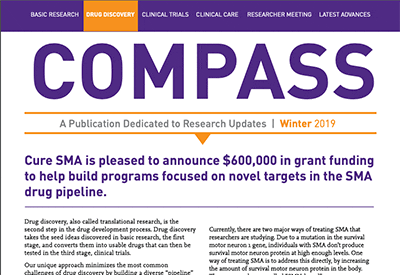On April 18, 2017, the SMA community—families, clinicians, researchers, industry and regulators—gathered for a Patient-Focused Drug Development (PFDD) Meeting with the FDA.

As part of the reauthorization of the Prescription Drug User Fee Act (PDUFA), the FDA is required to gather community feedback more systematically, through events such as this PFDD meeting, and incorporate that feedback into decisions made on drug development.
The goal of the PFDD meeting was to provide the FDA with an overview of the impact SMA has on individuals and families, and of the expectations and priorities for current and future treatments. This meeting with the SMA community is only the second externally led PFDD meeting to be granted.
“We want to make sure we understand the impact of the disease and what patients prioritize in the treatment of their disease. Those are two specific areas of extreme importance to us,” said Billy Dunn, MD, director of the Division of Neurology Products in the FDA’s Center for Drug Evaluation and Research, during his opening remarks.
“What we hear today will help us to think about clinical trial design, what outcome measures to use in clinical trials, what really matters to patients, and how we as regulators should think about the balance of risks and benefits for patients with SMA,” said Wilson Bryan, MD, director of the Office of Tissues and Advanced Therapies in the FDA’s Center for Biologics Evaluation and Research. “Most of our medical education comes from patients. This [meeting] gives us as regulators the opportunity and the privilege to continue our education by listening to you.”
The Impact of SMA
Twenty different panelists, representing both patients and caregivers of all types, ages and stages of SMA, testified as part of the meeting. Each round of panelist testimony was followed by a period of facilitated discussion and polling questions. Over 400 individuals participated, including in-person and webcast audiences.
“Your voice, which we heard today loud and clear and in great detail, helps FDA as we perform our public health mission and as we evaluate and approve new drug applications,” said Jonathan Goldsmith, MD, associate director for rare diseases in the Office of New Drugs in the FDA’s Center for Drug Evaluation and Research.
Some of the key themes, as summarized by Dr. Goldsmith, included:
- The diagnostic journey, particularly for individuals with SMA type II or III
- The impact of respiratory complications in SMA
- The impact of the loss of the ability to swallow in SMA type I
- The importance of mobility issues
- Difficulties with the activities of daily living
- The impact of fatigue, weakness and muscle pain
- The complications and benefits of surgical intervention
- The challenges of managing complicated medical care at home
- The impact of sometimes prolonged hospitalizations
- The impact of frequent medical visits, including transportation of patient and equipment
- The impact on the family, including social isolation and mental health issues
- The importance of equipment, such as ventilators for home use
- The use of computer technology, including for communication
- Advancements in robotics, wheelchairs and other assistive technology
- The community’s views on new treatments and those under development
- Individual and collective thought processes when a new treatment comes out
- How individual families make individual decisions to best fit their unique needs
Despite the often difficult burden of SMA, Dr. Goldsmith also praised the community for “your commitment and love for your children; your courage and determination as adults, older children and teens; and how you maintain hope and unity.”
Charting a Course for Current and Future Therapies
The PFDD meeting also presented an opportunity to assess the current landscape of SMA, with Spinraza, an approved treatment, now available, and “unambiguously, unequivocally indicated for the entire population,” according to Dr. Dunn. However, even with the approval of Spinraza, much more work remains to be done to develop a range of treatments that will cover all ages, types and stages of SMA.
In opening remarks, Dr. Dunn cited the important timing of the meeting, coming on the heels of the first-ever approved therapy for SMA. Dr. Dunn acknowledged the “unrelenting approach” of Biogen, Ionis and the SMA community in reaching the milestone of the first-ever approval, and in continuing to pursue further treatments.
“I’m excited as you all are that there’s a new treatment available,” Dr. Goldsmith added, “but I’m also excited that there’s lots of members of industry here. So I don’t think that this is the only treatment that will be available, and you’ll have other kinds of options in the coming years.”
Expanding the Community
Both the panelists and FDA speakers recognized the importance of maintaining a strong and unified community in SMA, and of expanding that community to include the industry researchers who are developing drugs, and the regulators who will review and make decisions on the approval of those drugs.
“I also want to thank you for fostering the strong sense of collaboration that is helping to bring new therapies for SMA to patients and families,” concluded Dr. Goldsmith. “The spirit of this organization is really an example to other communities about how you do drug development, how you raise money, how you invest that money in trying to advance things from the laboratory to the clinic, how you give out research grants…and how you get interest from regulated industry.”
“I think it’s the folks with SMA, I think it’s the families of patients with SMA, I think it’s those of you who champion SMA that deserve all the applause in the world,” said Dr. Dunn. “Each step of the way with the SMA community has been a distinct pleasure. Thank you for allowing us to be part of your community.”
Thank You
Thank you to all the FDA members who attended, and particularly to Drs. Dunn, Bryan and Goldsmith for providing the opening and closing remarks. Thanks also to Dr. John Day for providing an opening overview of SMA, and to James Valentine, JD, MHS, for moderating the discussion.
Thank you to our panelists for their incredible generosity with their time and their stories: Gina Cannady, Debbie Cuevas, Scott Ellis, Kristen Farrell, Christine Getman, Grace Grutter, Kelly Jankowski, Patti Kemp, Rio Landa, Kristen Lasko, Jungin Angie Lee, Kathryn McBride, Christina Murray, Brad Nunemaker, Kevin Schaefer, Danyelle Sun, Hugo Trevino, Lyza Wiesman, Brynne Willis and Jessica White. Thanks also to the in-person and webcast audiences for their valuable and thoughtful contributions.
Thank you to the members of the SMA Industry Collaboration for their support of this meeting: Astellas, AveXis, Biogen, Novartis, Roche/Genentech, Cytokinetics, Ionis, MDA and the SMA Foundation.



